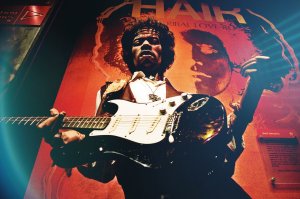
A lot of producers and musicians agree that if Hendrix had lived longer, he would’ve eventually gotten into rap and hip hop. BBC Radio 6 spoke to former Hendrix producer Eddie Kramer, who said, “This whole idea of street music would have definitely influenced him… The next step? Who knows… He may have even gotten into rap.”
Considering the level of experimentation that Hendrix brought to the table, this theory actually makes a lot of sense. Although Hendrix is not exactly known as a pioneer of electronic music, it was his experiments on guitar that paved the way for his contemporaries and future musicians to understand and apply the harmonic potentials of noise, feedback, and electronically produced music in general.
In fact, if you listen to a lot of modern hip hop and/or RnB, you’ve probably already heard how much Hendrix’s musical direction goes well with these soulful genres. His 1967 hit song Fire was sampled in 2009 by Lupe Fiasco in a song of the same name. Purple Haze, which is arguably his most famous hit, was used by Method Man and Redman to produce the song How High in 1995.
Even Frank Ocean, who’s considered to be one of the most influential RnB artists today, borrowed from the Jimi Hendrix Experience’s Little Miss Lover. He used parts of the song to produce Crack Rock, a track on his debut studio album, Channel Orange. Who Sampled reveals many other modern hip hop artists who also used Hendrix’s work in their songs, including Joey Bada$$, A Tribe Called Quest, Beastie Boys, Fat Joe, Mos Def, and Chuck D.
Live hip hop is no stranger to Hendrix’s work as well, as one of our contributors previously covered here on I Am Hip Hop Magazine. In a recent concert that was headlined by MC-producers Krafty Kuts and Chali 2na, Krafty opened their first set with a sample from Purple Haze, prompting an energetic response from the crowd that set up the rest of the night.
Hendrix’s influence on contemporary hip hop actually extends beyond just musicality. In 2010, Drake successfully launched his first headlining tour titled Light Dreams and Nightmares. If those words give off a psychedelic vibe, that’s because that was Drake’s intent. He told MTV News that the stunning setup of the tour, which began in Miami, was without a doubt heavily influenced by Jimi Hendrix. He said, “Not necessarily in any set that he designed, but more so his music and his vibe… it’s very psychedelic.”
Even outside the world of music and performance, you can’t escape the influence of the world’s most iconic guitarist. Believe it or not, even the world of digital gaming is equally obsessed with the guy. Jimi Hendrix’s music is brought to life on Foxy game’s slot game on the musician, which is just one of the games in its three-part series dedicated to both living and dead musical icons. The game takes players on a psychedelic ride and even features some of the guitarist’s greatest songs, such as Little Wing, Crosstown Traffic, and the aforementioned Purple Haze. Stranger still is The Jimi Hendrix Case by Adventure Game studios, in which the player is tasked with solving the murder of Jimi Hendrix, in a world where every character is named Jimi Hendrix. In this world, seemingly no one and everyone committed the heinous crime. If anything, these games are tributes to the man’s experimental swagger and fascinating bravado.
These are just some of the many ways in which Jimi Hendrix’s spirit lives on in hip hop and other modern media. More than 40 years after his death, rappers, producers, and other artists are still finding new inspiration in his old works – the very definition of timeless musicianship.
